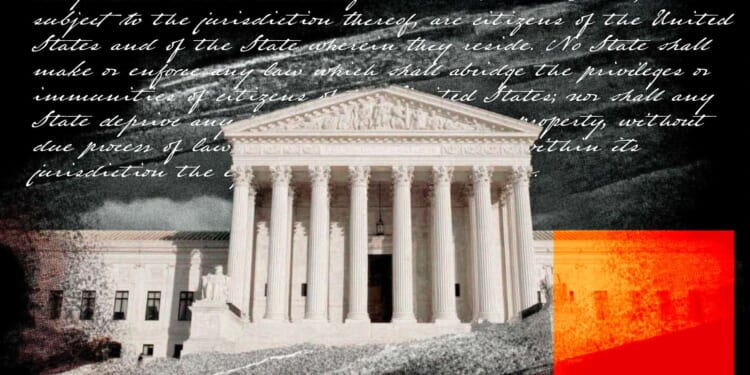The U.S. Supreme Court’s 2025–2026 term, which officially kicks off next week, was already on track to be a notable one thanks to the impending SCOTUS showdown over the scope of President Donald Trump’s power to fire top officials from “independent” agencies such as the Federal Trade Commission and Federal Reserve.
But now the coming term is set to become even bigger. That’s because after repeatedly losing in the lower courts, Trump has finally asked the Supreme Court to review the constitutionality of his executive order purporting to deny birthright citizenship to millions of U.S.-born children.
You’re reading Injustice System from Damon Root and Reason. Get more of Damon’s commentary on constitutional law and American history.
As you may recall, the Supreme Court already sort of danced around the edges of birthright citizenship last spring when it heard Trump v. CASA, a case that arose from the birthright citizenship controversy yet ultimately focused on the separate issue of the propriety of nationwide injunctions issued by federal district court judges. Coming out of that case, it was an open question as to when the administration might seek the Supreme Court’s review of the underlying executive order.
We now have our answer to that question. Late last week, the Trump administration asked the Supreme Court to fully weigh in, urging the justices to find that Trump’s order is consistent with the Citizenship Clause of the Fourteenth Amendment, which says, “All persons born or naturalized in the United States, and subject to the jurisdiction thereof, are citizens of the United States and of the State wherein they reside.”
In fact, Trump’s order runs counter to the text, history, and original public meaning of the Fourteenth Amendment, which guarantees U.S. citizenship to all but an extremely narrow subset of U.S.-born children, such as those whose parents are foreign diplomats and who are therefore not “subject to the jurisdiction” of the United States. If the Supreme Court’s “originalist” majority practices what it preaches, Trump’s executive order will lose 9–0 on the merits, and deservedly so.
I don’t expect the Supreme Court to wait too long before agreeing to take this case up. The justices must be aware that the reckoning over Trump’s unlawful birthright citizenship order is already long overdue.
We seem to be living in boom times for Supreme Court books. And I don’t just mean books written about the Supreme Court. I also mean books written by members of the Supreme Court.
Last year brought us Over Ruled by Justice Neil Gorsuch. Last month brought us Listening to the Law by Justice Amy Coney Barrett. And now, next month will bring us Life, Law & Liberty, the new memoir from retired Justice Anthony Kennedy.
My hopes are not exactly sky-high for this Kennedy book, but I do confess to feeling a slight hint of cautious optimism. After all, his legal career is certainly fascinating if you care about the Supreme Court’s doings. For many years, Kennedy was the “swing” vote on a closely divided Court, which meant that he left his mark on the law, for better and worse, in ways that most justices can only dream about.
Kennedy also enjoyed the rare distinction, as I remarked when he retired in 2018, of having been “denounced by every major faction in American politics.” For example, conservatives attacked Kennedy for his votes in favor of abortion rights and gay marriage; liberals attacked him for writing the Citizens United opinion; and libertarians attacked him for signing off on eminent domain abuse.
Such legal battles, even if narrated in an entirely vindictive and one-sided fashion by Kennedy, could still make for intriguing memoir fodder. Or at least that’s my hope. We’ll see.















